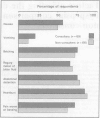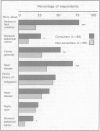Abstract
To identify factors associated with the decision to consult with dyspepsia, patients with dyspepsia were identified from a postal survey in the community. A random sample of 69 patients who had consulted their general practitioner and 66 patients with dyspepsia who had not consulted were interviewed in their homes. Differences in consultation behaviour were not explained by differences in self-reported severity or frequency of symptoms or by the presence of associated symptoms. The most striking difference between the two groups was concern among the consulters about the possible seriousness of symptoms. Consulters were also more likely to be worried about cancer and heart disease and to have experienced more disruptive or threatening life events than the non-consulters. These results emphasize the importance of looking beyond the presentation of common symptoms in general practice to patients' fears about the significance of the symptoms and to non-physical determinants of consultation behaviour.
Full text
PDF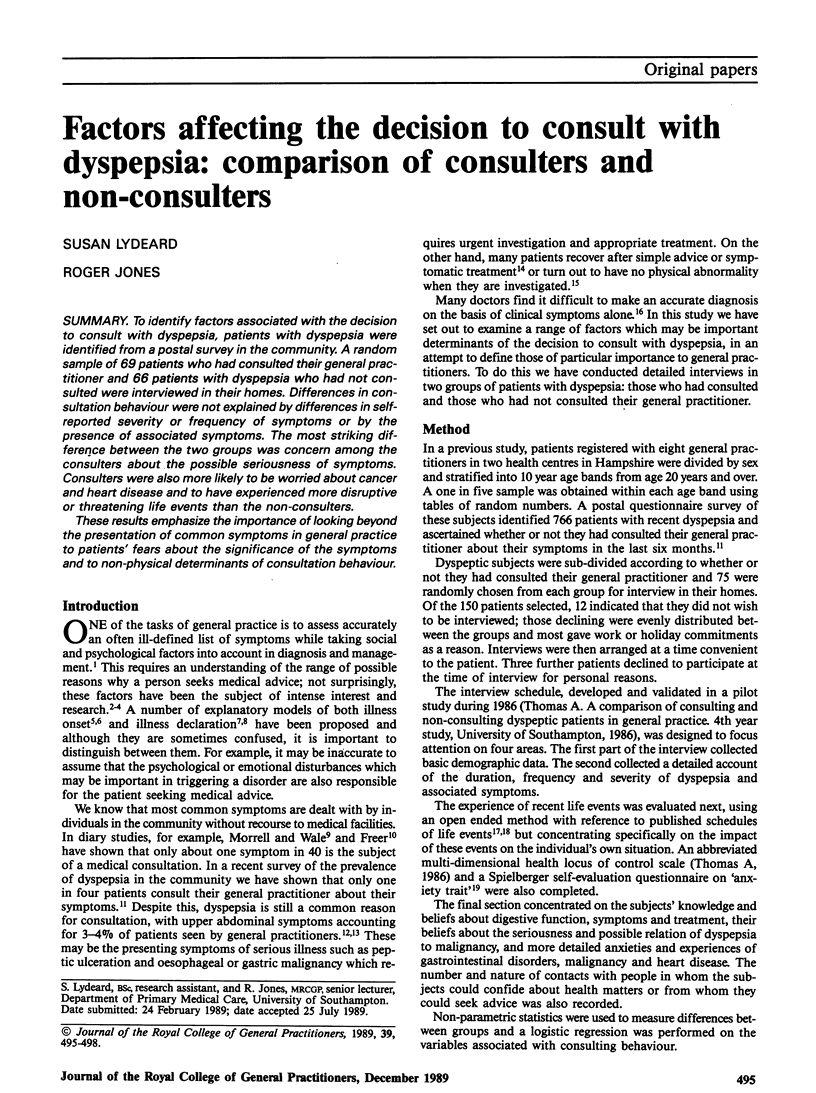
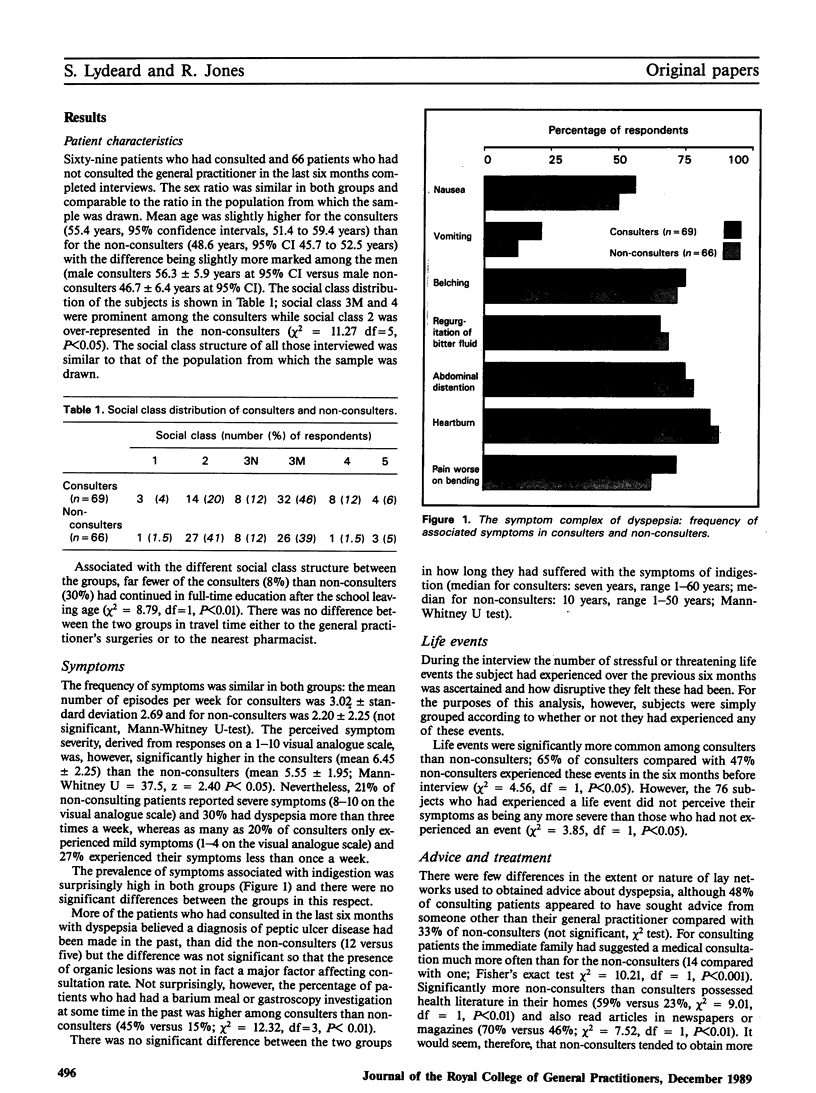
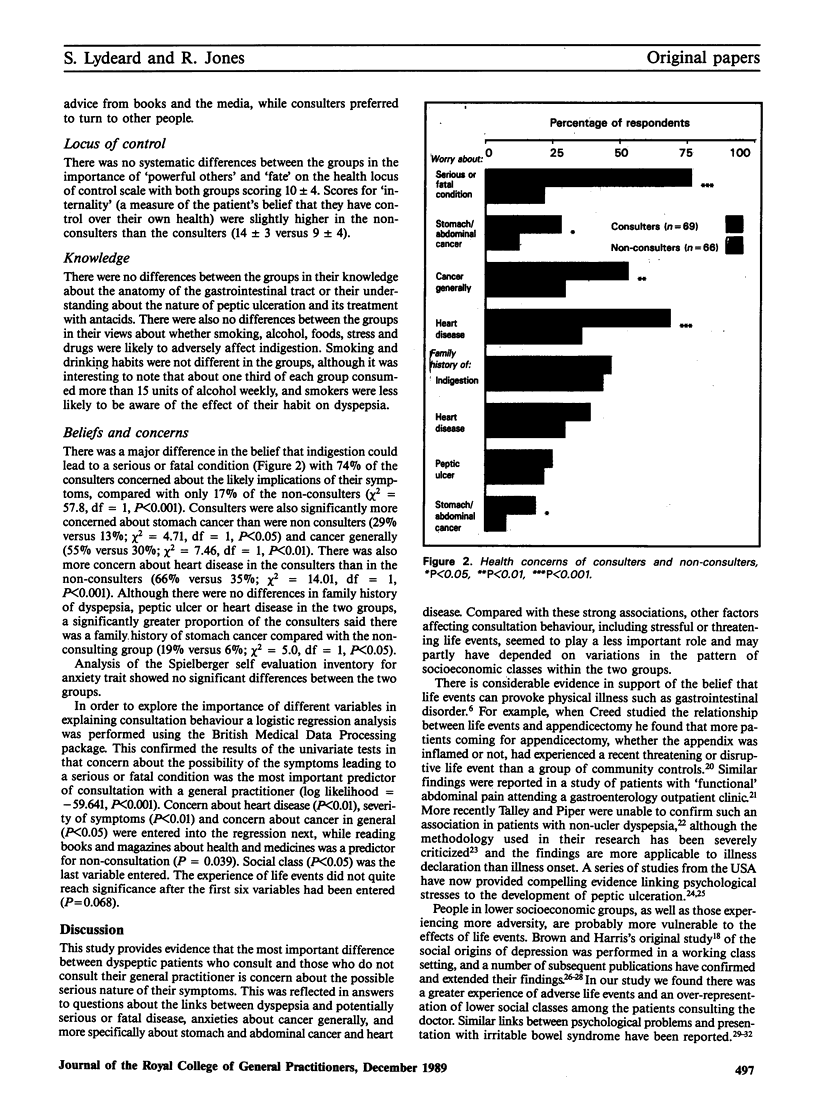
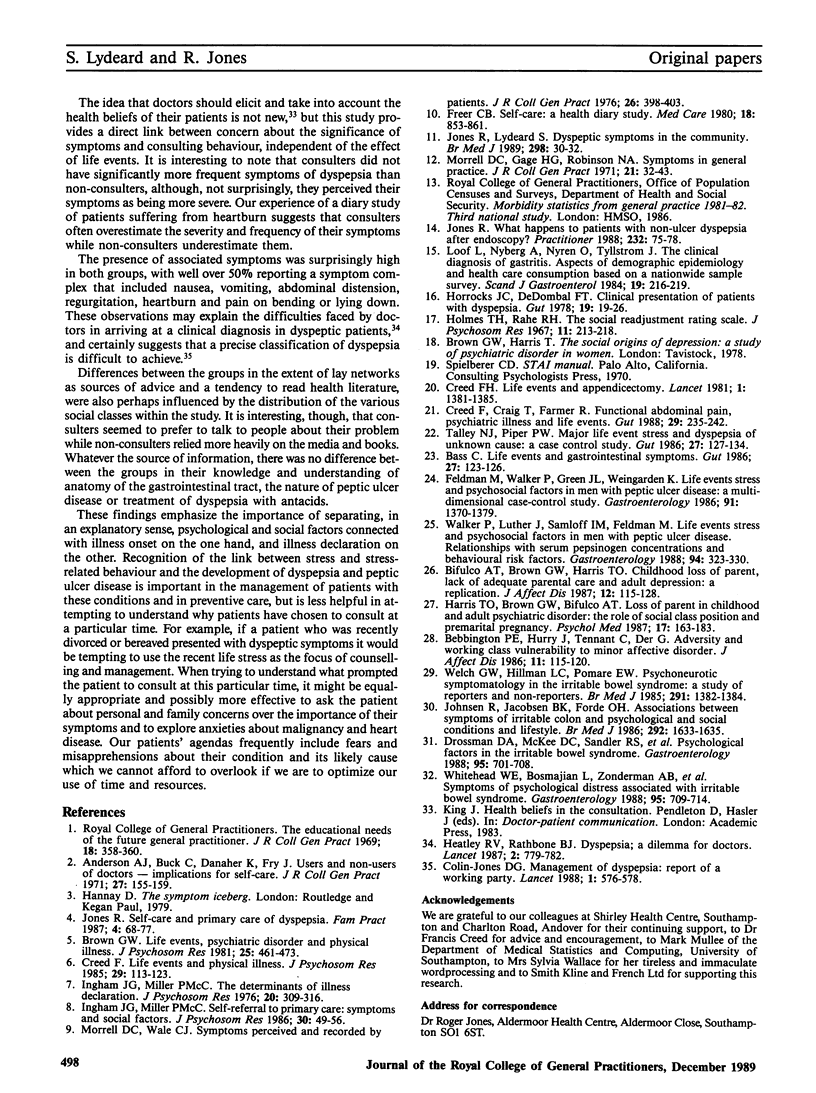
Images in this article
Selected References
These references are in PubMed. This may not be the complete list of references from this article.
- Adami H. O., Agenäs I., Gustavsson S., Löf L., Nyberg A., Nyrén O., Tyllström J. The clinical diagnosis of 'gastritis'. Aspects of demographic epidemiology and health care consumption based on a nationwide sample survey. Scand J Gastroenterol. 1984 Mar;19(2):216–219. [PubMed] [Google Scholar]
- Anderson J. A., Buck C., Danaher K., Fry J. Users and non-users of doctors--implications for self-care. J R Coll Gen Pract. 1977 Mar;27(176):155–159. [PMC free article] [PubMed] [Google Scholar]
- Bass C. Life events and gastrointestinal symptoms. Gut. 1986 Feb;27(2):123–126. doi: 10.1136/gut.27.2.123. [DOI] [PMC free article] [PubMed] [Google Scholar]
- Bebbington P. E., Hurry J., Tennant C., Der G. Adversity and working class vulnerability to minor affective disorder. J Affect Disord. 1986 Sep-Oct;11(2):115–120. doi: 10.1016/0165-0327(86)90016-9. [DOI] [PubMed] [Google Scholar]
- Bifulco A. T., Brown G. W., Harris T. O. Childhood loss of parent, lack of adequate parental care and adult depression: a replication. J Affect Disord. 1987 Mar-Apr;12(2):115–128. doi: 10.1016/0165-0327(87)90003-6. [DOI] [PubMed] [Google Scholar]
- Creed F., Craig T., Farmer R. Functional abdominal pain, psychiatric illness, and life events. Gut. 1988 Feb;29(2):235–242. doi: 10.1136/gut.29.2.235. [DOI] [PMC free article] [PubMed] [Google Scholar]
- Creed F. Life events and appendicectomy. Lancet. 1981 Jun 27;1(8235):1381–1385. doi: 10.1016/s0140-6736(81)92567-8. [DOI] [PubMed] [Google Scholar]
- Creed F. Life events and physical illness. J Psychosom Res. 1985;29(2):113–123. doi: 10.1016/0022-3999(85)90032-7. [DOI] [PubMed] [Google Scholar]
- Drossman D. A., McKee D. C., Sandler R. S., Mitchell C. M., Cramer E. M., Lowman B. C., Burger A. L. Psychosocial factors in the irritable bowel syndrome. A multivariate study of patients and nonpatients with irritable bowel syndrome. Gastroenterology. 1988 Sep;95(3):701–708. doi: 10.1016/s0016-5085(88)80017-9. [DOI] [PubMed] [Google Scholar]
- Feldman M., Walker P., Green J. L., Weingarden K. Life events stress and psychosocial factors in men with peptic ulcer disease. A multidimensional case-controlled study. Gastroenterology. 1986 Dec;91(6):1370–1379. doi: 10.1016/0016-5085(86)90189-7. [DOI] [PubMed] [Google Scholar]
- Freer C. B. Self-care: a health diary study. Med Care. 1980 Aug;18(8):853–861. doi: 10.1097/00005650-198008000-00006. [DOI] [PubMed] [Google Scholar]
- Harris T., Brown G. W., Bifulco A. Loss of parent in childhood and adult psychiatric disorder: the role of social class position and premarital pregnancy. Psychol Med. 1987 Feb;17(1):163–183. doi: 10.1017/s0033291700013064. [DOI] [PubMed] [Google Scholar]
- Heatley R. V., Rathbone B. J. Dyspepsia: a dilemma for doctors? Lancet. 1987 Oct 3;2(8562):779–782. doi: 10.1016/s0140-6736(87)92509-8. [DOI] [PubMed] [Google Scholar]
- Holmes T. H., Rahe R. H. The Social Readjustment Rating Scale. J Psychosom Res. 1967 Aug;11(2):213–218. doi: 10.1016/0022-3999(67)90010-4. [DOI] [PubMed] [Google Scholar]
- Horrocks J. C., De Dombal F. T. Clinical presentation of patients with "dyspepsia". Detailed symptomatic study of 360 patients. Gut. 1978 Jan;19(1):19–26. doi: 10.1136/gut.19.1.19. [DOI] [PMC free article] [PubMed] [Google Scholar]
- Ingham J. G., Miller P. M. Self-referral to primary care: symptoms and social factors. J Psychosom Res. 1986;30(1):49–56. doi: 10.1016/0022-3999(86)90065-6. [DOI] [PubMed] [Google Scholar]
- Ingham J. G., Miller P. M. The determinants of illness declaration. J Psychosom Res. 1976;20(4):309–316. doi: 10.1016/0022-3999(76)90082-9. [DOI] [PubMed] [Google Scholar]
- Johnsen R., Jacobsen B. K., Førde O. H. Associations between symptoms of irritable colon and psychological and social conditions and lifestyle. Br Med J (Clin Res Ed) 1986 Jun 21;292(6536):1633–1635. doi: 10.1136/bmj.292.6536.1633. [DOI] [PMC free article] [PubMed] [Google Scholar]
- Jones R., Lydeard S. Prevalence of symptoms of dyspepsia in the community. BMJ. 1989 Jan 7;298(6665):30–32. doi: 10.1136/bmj.298.6665.30. [DOI] [PMC free article] [PubMed] [Google Scholar]
- Jones R. Self-care and primary care of dyspepsia: a review. Fam Pract. 1987 Mar;4(1):68–77. doi: 10.1093/fampra/4.1.68. [DOI] [PubMed] [Google Scholar]
- Jones R. What happens to patients with non-ulcer dyspepsia after endoscopy? Practitioner. 1988 Jan;232(1441):75-6, 78. [PubMed] [Google Scholar]
- Management of dyspepsia: report of a working party. Lancet. 1988 Mar 12;1(8585):576–579. [PubMed] [Google Scholar]
- Morrell D. C., Gage H. G., Robinson N. A. Symptoms in general practice. J R Coll Gen Pract. 1971 Jan;21(102):32–43. [PMC free article] [PubMed] [Google Scholar]
- Morrell D. C., Wale C. J. Symptoms perceived and recorded by patients. J R Coll Gen Pract. 1976 Jun;26(167):398–403. [PMC free article] [PubMed] [Google Scholar]
- Talley N. J., Piper D. W. Major life event stress and dyspepsia of unknown cause: a case control study. Gut. 1986 Feb;27(2):127–134. doi: 10.1136/gut.27.2.127. [DOI] [PMC free article] [PubMed] [Google Scholar]
- Walker P., Luther J., Samloff I. M., Feldman M. Life events stress and psychosocial factors in men with peptic ulcer disease. II. Relationships with serum pepsinogen concentrations and behavioral risk factors. Gastroenterology. 1988 Feb;94(2):323–330. doi: 10.1016/0016-5085(88)90419-2. [DOI] [PubMed] [Google Scholar]
- Welch G. W., Hillman L. C., Pomare E. W. Psychoneurotic symptomatology in the irritable bowel syndrome: a study of reporters and non-reporters. Br Med J (Clin Res Ed) 1985 Nov 16;291(6506):1382–1384. doi: 10.1136/bmj.291.6506.1382. [DOI] [PMC free article] [PubMed] [Google Scholar]
- Whitehead W. E., Bosmajian L., Zonderman A. B., Costa P. T., Jr, Schuster M. M. Symptoms of psychologic distress associated with irritable bowel syndrome. Comparison of community and medical clinic samples. Gastroenterology. 1988 Sep;95(3):709–714. doi: 10.1016/s0016-5085(88)80018-0. [DOI] [PubMed] [Google Scholar]



